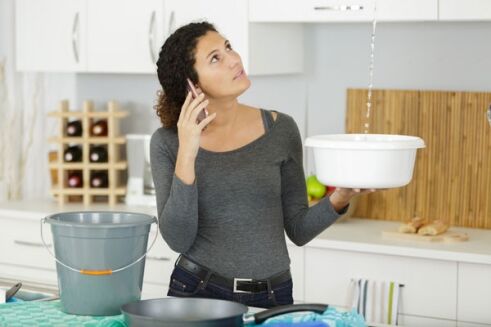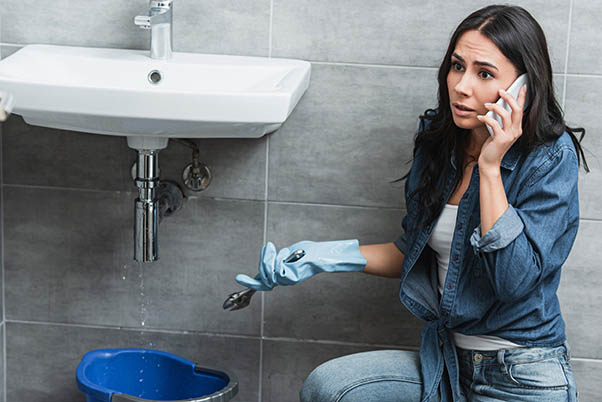Urgent Plumbing Tips: Steps to Take Until A Plumber Arrives
Urgent Plumbing Tips: Steps to Take Until A Plumber Arrives
Blog Article
What're your opinions regarding What to Do During a Plumbing Emergency?

Plumbing emergencies can strike at any time, causing stress and prospective damages to your home. Whether it's a ruptured pipeline, a clogged up drainpipe, or a dripping tap, recognizing exactly how to handle the situation until an expert plumbing technician arrives can save you from further complications. This write-up provides essential emergency situation pipes pointers to aid you minimize damages and gain back control throughout a pipes situation.
Turn Off the Water Supply
The first step in any pipes emergency is to shut off the water supply. For localized issues, such as a leaking faucet or bathroom, shut off the valve near the fixture. When it comes to a significant leak or burst pipe, find your home's primary water shut-off shutoff and transform it off promptly. Recognizing the area of these shutoffs ahead of time can conserve beneficial time throughout an emergency situation.
Address Tiny Leakages with Momentary Solutions
Small leaks can quickly become significant troubles if left uncontrolled. Use these short-term fixes until professional aid gets here:
While these fixes aren't permanent, they can help minimize water loss and damages.
Unclog Drains Safely
A clogged drainpipe can be an irritating and untidy issue. Here's how to tackle it:
If these techniques don't function, stay clear of utilizing excessive force, as it might aggravate the blockage.
Take Care Of Overflowing Toilets
An overruning bathroom can cause immediate disorder. Right here's what you ought to do:
Shut down Your Hot Water Heater
In specific emergencies, such as a ruptured pipeline, it's a good idea to shut off your water heater. This prevents overheating or damage to the device when water stops flowing. Switch off the power supply to the water heater (electrical or gas) and allow it cool down to stay clear of prospective hazards.
Momentarily Stop a Ruptured Pipe
A ruptured pipe can bring about significant water damages in minutes. To mitigate the problem:
Call an expert plumber instantly to deal with the trouble completely.
Take Care Of Frozen Pipeline Thoroughly
In chillier environments, icy pipes are a typical emergency situation. If you believe a frozen pipe:
Prevent Further Damage
Taking quick action to lessen damages can conserve you money and time in the long run. Here's how:
. Have an Emergency Plumbing Kit
Prepare a basic plumbing emergency situation package to take care of small problems efficiently. Your kit ought to include:
Having these tools available can make a significant difference in your ability to take care of emergency situations.
Know When to Call an Expert.
While quick fixes can assist temporarily, certain pipes issues require prompt specialist interest. Call a plumbing technician if:.
Immediately speaking to an expert ensures the concern is dealt with correctly and protects against more problems.
Verdict.
Pipes emergencies can be frustrating, however with the right expertise and tools, you can take care of the circumstance successfully until assistance arrives. By shutting off the water supply, resolving little leaks, and making use of momentary repairs, you can decrease damage and keep your home safe. Bear in mind, these ideas are temporary options; always consult a qualified plumber to take care of the source of the problem. Prep work and quick reasoning are your finest allies in any plumbing emergency situation.
8 Helpful Tips for Managing Plumbing Emergencies at Home
If your plumbing system hasn’t failed once, wait for it because almost everyone has a story to tell. Sometimes, it could be simple emergencies such as a leaking pipe, a blocked cistern, or even a big burst pipe. In situations like this, you need to have some handy tips to save you some money and from possible damages.
Take care of minor issues early.
Sometimes, you could have avoided an emergency by taking proactive measures while it was still early. Some major plumbing emergencies can be a result of an ignored minor issue. We recommend that you have items like plumbing tapes and other related items. A plumbing tape can allow you to manage minor leaks before the plumber arrives.
Cut off the water supply.
This tip is essential in almost any type of leakage problem. For problems like minor leakages in the toilet or kitchen, turn off the supply that takes water to the affected pipes. If the leakage is a major pipe, you must shut off the supply valve to the entire building. This will help you avoid flooding your home and neighbors if you share a flat.
Know your plumbing system
Folks typically move into a new apartment without understanding the water supply around the building. This can prove disastrous if a water emergency arises and the plumber is far away. The previous tip will prove useless if you don’t practice this one. More importantly, know where your water shut-off valve is located – you’ll need that knowledge to prevent potential home floods.
Have some common handy tools
There are lots of plumbing emergencies that you can handle without hiring a plumber. That’s why you must keep some tools available always. Some tools that you can use to fix simple plumbing emergencies easily include plumbing tapes, screwdrivers, thread seal tapes, plungers, pliers, tape measures, and rubber gloves.
Insulate your pipes from cold
You’ll save yourself from many plumbing expenses if you protect your water pipes from the cold. This is because of the harmful effects that cold weather can have on your pipes. During winter, your pipes can burst from being overly expected to freezing temperatures. So, make sure insulators are there to keep the pipes working correctly.
Avoid practices that will clog your toilet.
Many people indulge in practices that can damage the plumbing system of the entire building. One of these is when they use their toilet to dispose-off garbage. They flush all kinds of things, such as paper towels, bandages, hairs, female sanitary products, etc., down the toilet. This will block your toilet in the long run, incurring unnecessary expenditures. Dump such waste in the trash instead.
Check your dials regularly.
Sometimes, there could be leakages in your home without noticing them in time. So, constantly monitor your water meter dial. If the dial is reading when there is nobody using water, this is an indicator that there is leaking. Check for leaks immediately. Call a plumber as soon as possible if you can’t find any.
https://www.constructionplacements.com/8-helpful-tips-for-managing-plumbing-emergencies-at-home/

I was shown that report about Expert Tips for Managing a Plumbing Emergency Until Help Arrives from a buddy on another domain. Enjoyed our content? Please quickly share it. Let other people discover it. Thank you so much for going through it.
Call Today Report this page